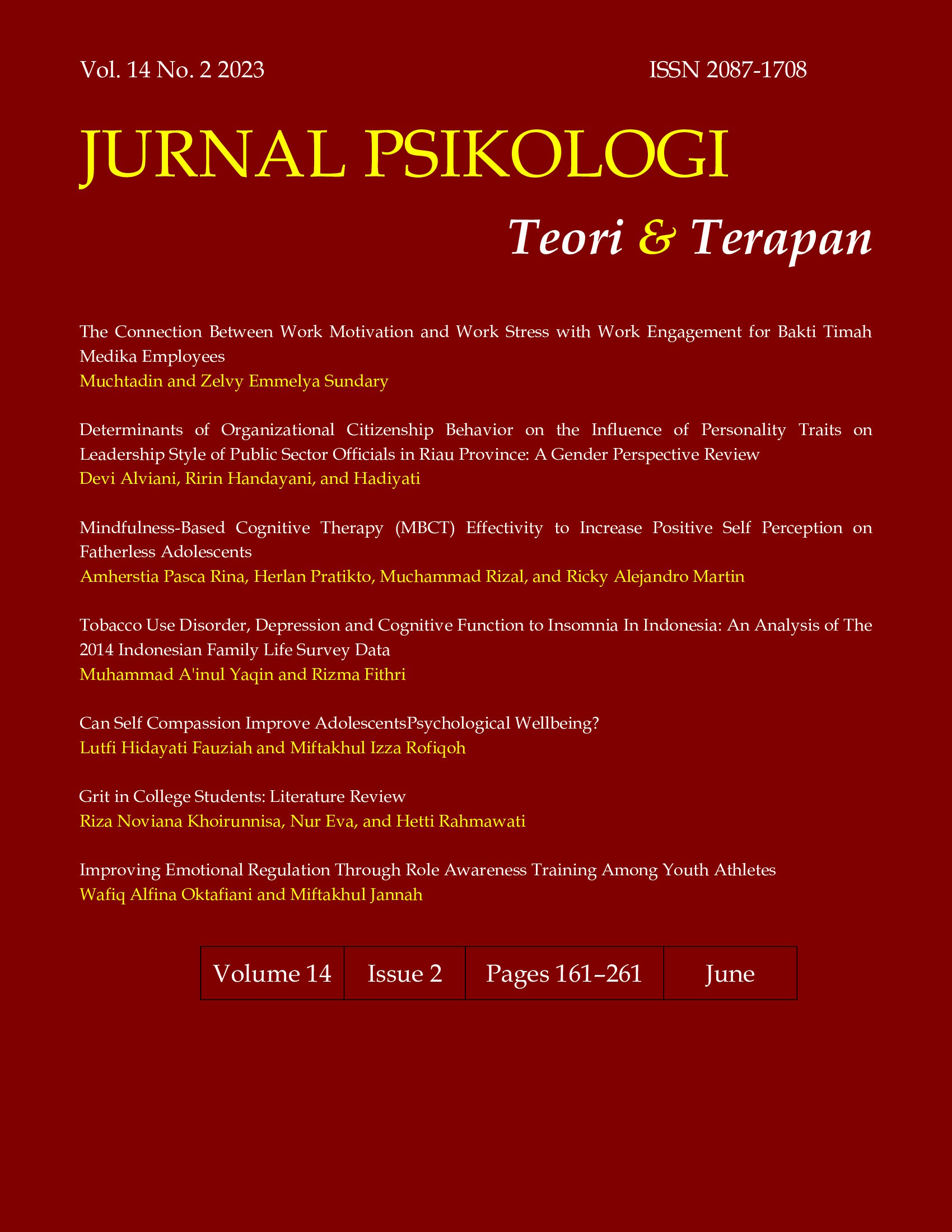Mindfulness-Based Cognitive Therapy (MBCT) Effectivity to Increase Positive Self Perception on Fatherless Adolescents
DOI:
https://doi.org/10.26740/jptt.v14n2.p193-205Keywords:
Fatherless, Mindfulness, Based Cognitive Therapy, Persepsi diri, Remaja, Fatherless, Mindfulness-based cognitive therapy, self-perception, teenager, persepsi diri, remaja, Terapi kognitif berbasis mindfulnessAbstract
Adolescence is said to be an unusual and challenging transitional period. Various kinds of problems involving youth groups are increasing day by day. Fatherlessness, or the loss of the father's role, is one of the problems. These various problems cause adolescents to tend to have negative self-perceptions. Therefore, positive self-perception among adolescents needs to be improved. This study aims to determine the effectiveness of MBCT to increase positive self-perception in fatherless adolescents. Participants in this study consisted of six adolescents who experienced fatherlessness and would receive the MBCT intervention. The research instrument consisted of the self-perception scale, adapted from Robbins. The data analysis technique in this study used the Mann-Whitney U Test with the help of SPSS. The results of the hypothesis test obtained a score of z = -2.491 with a significance of p = 0.013. This means that there is a significant difference in increasing self-perception among fatherless adolescents. The results of the effect size test are known based on Rank-biserial totaling 0.861. This means that there is a great influence of Mindfulness-Based Cognitive Therapy on increasing positive self-perceptions in fatherless adolescents. Then adolescents, so it is concluded that Mindfulness-Based Cognitive Therapy is effective in increasing fatherless adolescents' self-perceptions.
Penelitian ini bertujuan untuk mengetahui kekuatan hubungan motivasi dan juga stres bekerja dengan work engagement secara masing-masing maupun simultan. Pendekatan kuantitatif dipakai dalam penelitian. Pengambilan sampel yang dipakai ialah metode sampel jenuh. Sebanyak 270 orang yang mengisi kuesioner dengan tingkat respon 17,21% dari total populasi. Metode analisis data memakai analisis deskriptif kuantitatif, korelasi sederhana dan korelasi berganda. Uji normalitas dan linearitas dipakai sebelum pengujian hipotesis. Temuan dalam penelitian ini ialah motivasi kerja berkorelasi positif dan kuat dengan work engagement. Stres kerja berkorelasi negatif dan lemah dengan work engagement. Motivasi dan stres kerja secara berbarengan berkorelasi positif dengan work engagement. Pihak perusahaan diharapkan memberikan pelatihan motivasi, meningkatkan tunjangan yang diberikan serta memberikan kebebasan dalam mengatur jadwal kerja dan cara bekerja agar karyawan lebih merasa terikat dengan pekerjaannya. Peneliti selanjutnya dapat menggunakan faktor yang memediasi hubungan antara stres kerja dengan work engagement guna menjelaskan lemahnya hubungan yang ditemukan dalam penelitian ini. Peneliti selanjutnya bisa juga membandingkan tingkat motivasi kerja, stres kerja dan work engagement pada karyawan yang memiliki posisi pekerjaan yang berbeda.
References
Alfasma, W., Santi, D. E., & Kusumandari, R. (n.d.). Loneliness dan perilaku agresi pada remaja fatherless (Vol. 3, Issue 01).
Asilah, & Hastuti, D. (2014). Hubungan Tingkat Stres Ibu Dan Pengasuhan Penerimaan-Penolakan Dengan Konsep Diri Remaja Pada Keluarga Bercerai. In Jur. Ilm. Kel. & Kons., Januari (Vol. 7, Issue 1).
Candra, W., Epriliani, P., Politeknik, J. K., & Denpasar, K. (2019). Mindfullness-Based Cognitive Therapy (Mbct) Menurunkan Tingkat Depresi Pada Pasien Diabetes Melitus. In Jurnal Gema Keperawatan | Desember (Vol. 12, Issue 2).
Devina P. (2022). Miris, Indonesia Masuk Peringkat Ketiga Fatherless Country. Beritajatim.Com.
Hurlock E B. (1980). Perkembangan Anak (Edisi Kedua) (2nd ed.). Erlangga New York: Academic Press.
Imanuddin Bayu. (2021). Pencegahan Merokok Pada Remaja. http://www.academia.edu/3988436/BAB_I_PENDAHULU
Ningsih D P. (2017). Studi Kasus tentang Siswi yang Memiliki Konsep Diri Negatif pada Kelas X SMA Mujahidin Pontianak Tahun 2017.
Palupi, A. O., Purwanto, E., & Noviyani D I. (2013). Educational Psychology Journal Pengaruh Religiusitas Terhadap Kenakalan Remaja. http://journal.unnes.ac.id/sju/index.php/epj
Reza ROur Father (less) Story: Potret 12 Fatherless Indonesia. (2019). Our Father (less) Story: Potret 12 Fatherless Indonesia (Vol. 3).
Sanjiwani, A. A. S., & Dewi, N. L. P. T. (2022). Peran Mindfulness-Based Cognitive Therapy (MBCT) dalam Menurunkan Kecemasan dan Depresi pada Pasien Kanker: Literature review The Role of Mindfulness-Based Cognitive Therapy (MBCT) In Reducing Anxiety and Depression Among Cancer Patients: Literature Review (Vol. 20).
Sarwono S. (2013). Psikologi Remaja. Rajawali Pers.
Sobur A. (2013). Psikologi Umum dalam Lintas Sejarah. CV Pustaka Setia.
Sugiyono. (2015). Metode Penelitian Pendidikan (Pendekatan Kuantitatif, Kualitatif, dan R&D). Alfabeta.
Suminar E, & Meiyuntariningsih T. (2015). Konsep Diri, Konformitas dan Perilaku Konsumtif pada Remaja (Vol. 4, Issue 02).
Suryanto, A. M. , H. I. , & A. I. N. (2012). Pengantar Psikologi Sosial. Pusat Penerbitan dan Percetakan Unair.
Wulandari F A, & Gamayanti I L. (2014). Mindfulness Based Cognitive Therapy Untuk Meningkatkan Konsep Diri Remaja Post-Traumatic Stress Disorder Mindfulness Based Cognitive Therapy To Improve The Self-Concept Of Adolescent With Post-Traumatic Stress Disorder. In Jurnal Intervensi Psikologi (Vol. 6, Issue 2). Desember.
Zindel V. Segal, J. M. G. W. J. D. T. (2012). Mindfulness-Based Cognitive Therapy for Depression, Second Edition (2nd ed.). The Guilford Press.
Downloads
Published
How to Cite
Issue
Section
License

This work is licensed under a Creative Commons Attribution-NonCommercial 4.0 International License.
Authors who publish in this journal agree to the following terms:
Copyright in any article is held by the author.
The author grants the journal, publication rights with the work simultaneously licensed under a Creative Commons Attribution License that allows others to share the work with an acknowledgment of the work's authorship and initial publication in this journal.
Authors may enter into separate, additional contractual arrangements for the non-exclusive distribution of the journal's published version of the work (e.g., posting it to an institutional repository or publishing it in a book), with an acknowledgment of its initial publication in this journal.
Authors are permitted and encouraged to post their work online (e.g., in an institutional repository or on their website) prior to and during the submission process, as this can lead to productive exchanges, as well as earlier and greater citation of published work.
 Abstract views: 1280
,
Abstract views: 1280
, PDF Downloads: 1066
PDF Downloads: 1066


















